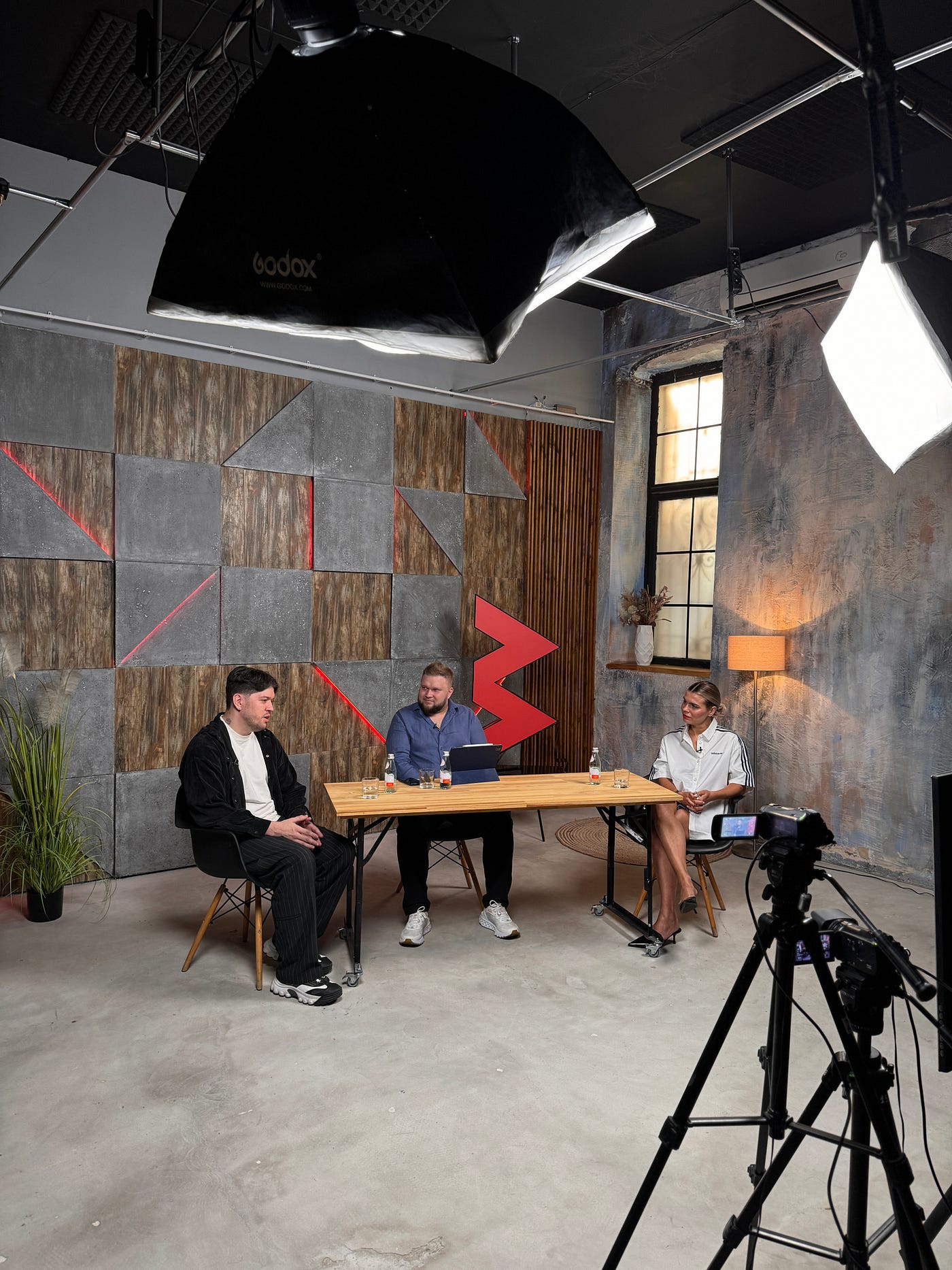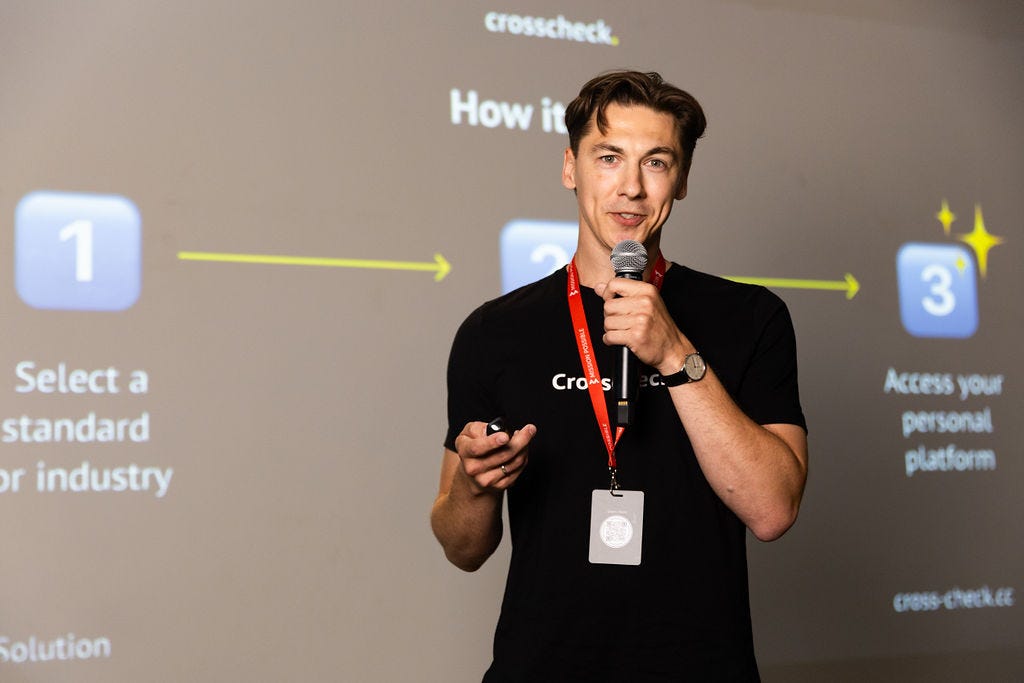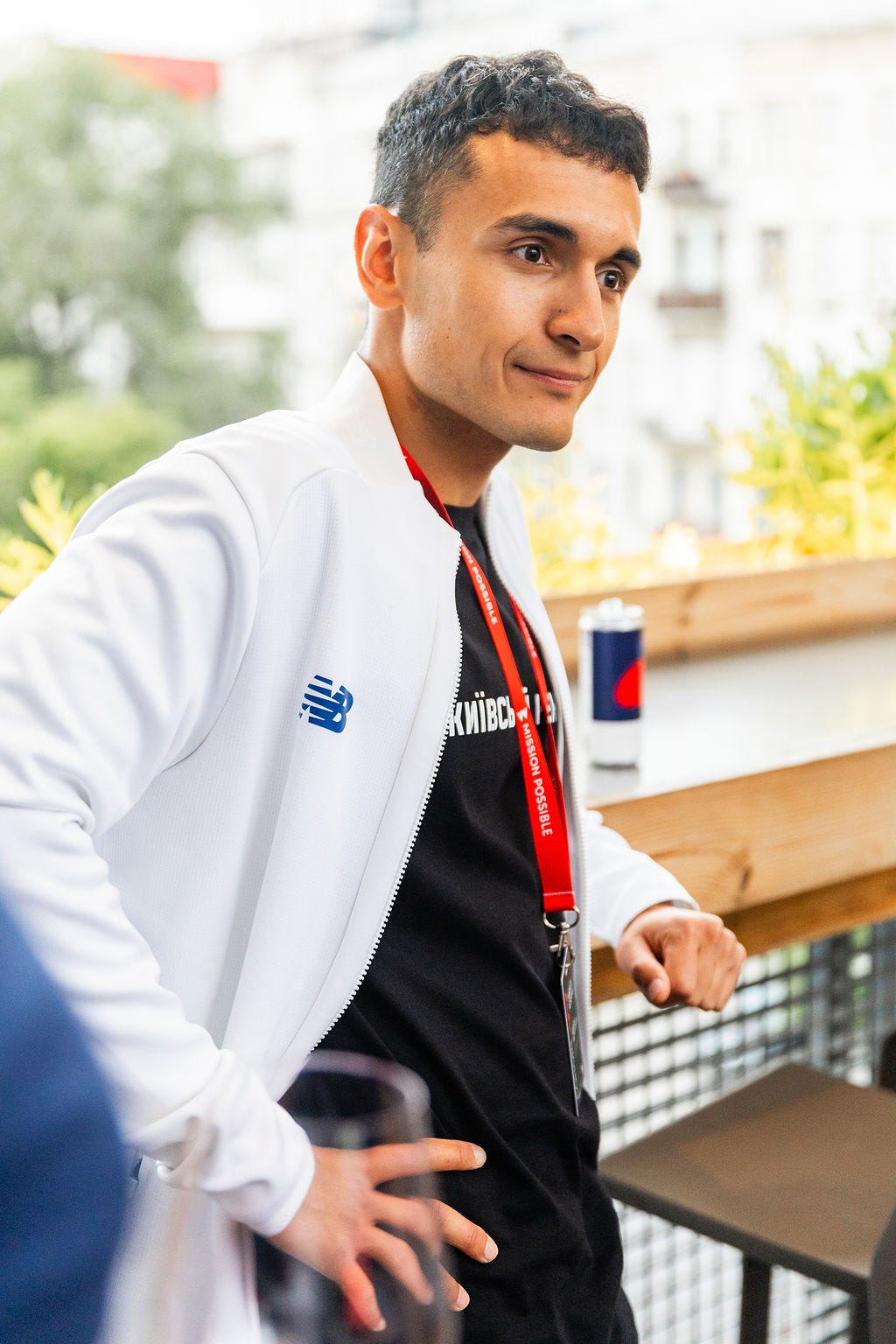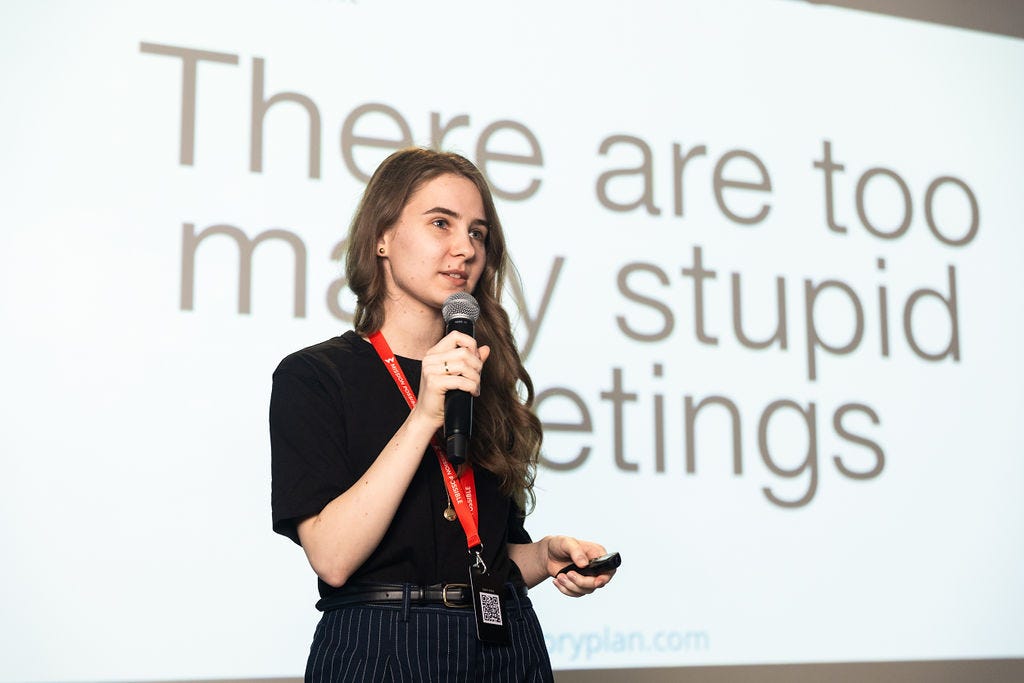August 8, 2024
August 16, 2025
Mission Possible venture-building program, supported by the Ukraine-Moldova American Enterprise Fund (UMAEF), is kicking off its second round for aspiring entrepreneurs and early-stage startups. Our partners: Centre of Innovation and Entrepreneurship INNOV8, Saïd Business School, the University of Oxford, and the startup community LIFT99 Kyiv Hub.
To highlight the new opportunities for future entrepreneurs and startups, the Mission Possible venture-building program held an open Q&A session. The program founder Sviat Sviatnenko, Head of Operations Dara Koval, and Director of Innovation, Education, and Entrepreneurship at the Ukraine-Moldova American Enterprise Fund (UMAEF) Anton Waschuk, discussed the program’s structure, opportunities, and benefits.
Program mentors — Alyona Mysko, founder and CEO of Fuelfinance, and Stakh Vozniak, founder and CEO of Cargofy — joined to share their experience.
Attention was also given to alumni of the 1st batch, who shared their journey and achievements: Ruslan Gazanfarov, founder and CEO of eventmate, Darka Azhnyuk, founder and CEO of Spry, and Bohdan Dreihaupt, founder of Crosscheck.
Mission Possible is an in-real-life venture-building program designed to help future founders and early-stage startups navigate their journey from 0 to 1 faster and smarter, avoiding the common pitfalls that can sink a startup.
An investment component is being added to the 2nd batch, enabling the right model of cooperation with startups and adherence to high industry standards.
Inexchange for participation, Mission Possible will take an admission fee of 2.5% equity in the startup. The program will also provide investments of up to $25,000 in exchange for an additional 2.5% equity for the best teams.
Participants will go through the program at LIFT99 Kyiv Hub, starting in October this year and wrapping up in March 2025.
“This community is all about being founder-friendly and helping entrepreneurs build tech startups in a strong network,” Sviat about Lift99.
As part of the partnership with LIFT99, participants will complete part of the the program at Lift99 Tallinn and attend demo days in Kyiv and Berlin, where they’ll pitch to Ukrainian and global investors.
The main partners are the Ukraine-Moldova American Enterprise Fund (UMAEF), which has been supporting Ukrainian entrepreneurs since 1994, and VC Fund u.ventures, which invests in Ukrainian and Moldovan founders at early stages.
The academic partner is Saïd Business School, University of Oxford, providing participants with certificates from one of the world’s top business schools, boosting their credibility as founders.
Mission Possible is seeking entrepreneurs from various professional backgrounds.
“At Mission Possible, we believe strong entrepreneurs come in all ages, backgrounds, and experiences. They’re united by the mission to build a product that solves a problem, provides value, and is used by people or companies. Our role is to provide the necessary tools and a powerful community of like-minded individuals for their most productive start and development,” said Sviat Sviatnenko, founder of Mission Possible.
There are two main audiences: “dreamers” those with ideas wanting to start a startup, and those who already have a startup but need help developing it.
Participants can apply by filling out one of the forms: dreamer or startup.
The program suits:
Passion and a desire to change the industry are key. English proficiency is essential for integration into the international ecosystem.
The program offers community support, resources, a playbook with advice, and preparation for international growth in European, UK, and US markets.
Anton Waschuk highlighted the Mission Possible community, which includes mentor support, investment help, and legal advice. These resources help startups focus on customer communication and product development.
“Our mentors aren’t just in Ukraine. We have mentors in USA, UK, and Europe, ready to provide practical advice on entering the international market, where to work, and what strategies to implement,” added Anton.
The program has three stages::
The Dive stage lasts for the first one and a half months, the most intensive period, including deep immersion in the community of mentors and partners, and learning the basics of creating startups.
The Execution stage focuses on implementing the ideas obtained during the Dive, emphasizing product creation and launch.
The final Scale stage prepares for investment attraction and business scaling.
The program addresses three key startup problems: lack of expertise, capital, and market access.
Head of operation Dara Koval outlined formats filling the six months:
The program also includes:
For startups, speed, and idea validation are crucial. Mentorship and networking significantly accelerate this process.
Alyona Mysko and Stakh Vozniak are successful entrepreneurs ready to share practical advice and knowledge with early-stage founders. They noted this support was what they lacked in their early stages, which could have helped develop their companies faster and more efficiently.
“For me, Mission Possible is something in Ukraine that you no longer need to go abroad for,” said Stakh Vozniak, founder and CEO of Cargofy.
Alyona emphasized Mission Possible as one of Ukraine’s most successful startup programs, offering knowledge, valuable contacts, and mentors, helping with sales, fundraising, product building, and team hiring.
“Networking and mentorship are key advantages of Mission Possible,” said Alyona Mysko, founder and CEO of Fuelfinance.

Stakh, an entrepreneur who went through an acceleration program in the US, gained the initial push and funding. The most important aspect was gaining systematicity for the startup, building processes, and setting up for long-term operation.
Mentors and advisors had a significant impact on his knowledge and startup development, providing consultations on specific issues.
Alyona transitioned to entrepreneurship from a classic business background. As an auditor at PwC, she constantly thought about optimizing the hours spent on managing finances for other companies. She applied this knowledge in consulting, creating financial systems for small and medium-sized businesses, and gradually automating processes using Google Sheets and No Code solutions.
In the early years of a startup, the CEO’s role is often “Chief of Everything” or “Chief of Experimentation,” a period of major experiments without a large execution team. Alyona noted that advice from colleagues and experts was invaluable during this time, highlighting that in the startup ecosystem, especially in Ukraine, founders are always ready to help and provide advice.
“We launched a new product, and now it’s growing rapidly. We received support from mentors and saw new development opportunities,”Bohdan Dreihaupt, founder of Crosscheck, a 1st-batch participant.
Bohdan’s startup helps businesses navigate sustainability compliance, a bureaucratic process that takes months. Crosscheck speeds this up threefold.
Applying for Mission Possible was an organic step in Bohdan’s desire to develop his product. Workshops and mentoring sessions helped him form a clear vision and development strategy.
One critical stage in Crosscheck’s development was preparing for a trip to the USA. Mission Possible provided Bohdan with essential contacts and introductions to key figures in the US entrepreneurial scene, particularly in Silicon Valley.
“I didn’t arrive as a newcomer starting from scratch. I had introductions. It was great knowing where you’re going, why, and who you’re meeting,”said Bohdan.
During his USA trip, Bohdan visited New York, Florida, and San Francisco, meeting potential partners and investors.

“For me, 80% of the value came from breakfasts and working in an environment with other entrepreneurs,” Ruslan Gazanfarov, founder and CEO of eventmate, a 1st-batch participant.
Ruslan Gazanfarov is building a system for selling and registering event participants through messengers, bringing event creators closer to their audience.
He said that participating in the program significantly boosted his self-confidence and tolerance for failures. Initially, any failure affected him strongly, but Mission Possible taught him to view them as part of the entrepreneurial journey.
Thanks to the program, Ruslan significantly developed his startup. He won a $100,000 grant from Google, a significant achievement for him and his team.
“I still can’t believe it. As a teenager, I dreamed of working at Google. My background is as an Android developer,” shared Ruslan.
In conclusion, Ruslan became the founder of a Ukrainian product that attracted funding from Google.

“Mission Possible was a transformational program for me as a beginner entrepreneur,” Darka Azhnyuk, founder and CEO of Spry, a 1st-batch participant.
Darka Azhnyuk is building a B2B platform for businesses that solves the problem of inefficient calls.
She applied for the program, recognizing it as a great opportunity for her startup’s development. Darka noted that mentorship and community support helped her quickly overcome failures and find the right solutions.
“Every fail is a lesson. It doesn’t make me or my product worse. It’s another lesson I’m learning,” added Darka.
Recently, Darka launched Spry on Product Hunt. Although the launch didn’t go as smoothly as expected due to changes in Product Hunt’s algorithms, Darka considers it successful. The team gathered around four hundred upvotes and received about a hundred comments.

1st-batch participants confirmed that Mission Possible is more than an educational program; it’s a real community of support and development for startups.